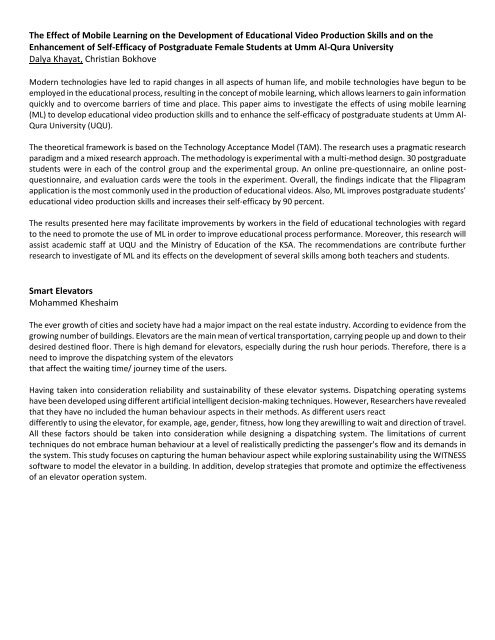Conference Programme FULL (1)
You also want an ePaper? Increase the reach of your titles
YUMPU automatically turns print PDFs into web optimized ePapers that Google loves.
The Effect of Mobile Learning on the Development of Educational Video Production Skills and on the<br />
Enhancement of Self-Efficacy of Postgraduate Female Students at Umm Al-Qura University<br />
Dalya Khayat, Christian Bokhove<br />
Modern technologies have led to rapid changes in all aspects of human life, and mobile technologies have begun to be<br />
employed in the educational process, resulting in the concept of mobile learning, which allows learners to gain information<br />
quickly and to overcome barriers of time and place. This paper aims to investigate the effects of using mobile learning<br />
(ML) to develop educational video production skills and to enhance the self-efficacy of postgraduate students at Umm Al-<br />
Qura University (UQU).<br />
The theoretical framework is based on the Technology Acceptance Model (TAM). The research uses a pragmatic research<br />
paradigm and a mixed research approach. The methodology is experimental with a multi-method design. 30 postgraduate<br />
students were in each of the control group and the experimental group. An online pre-questionnaire, an online postquestionnaire,<br />
and evaluation cards were the tools in the experiment. Overall, the findings indicate that the Flipagram<br />
application is the most commonly used in the production of educational videos. Also, ML improves postgraduate students’<br />
educational video production skills and increases their self-efficacy by 90 percent.<br />
The results presented here may facilitate improvements by workers in the field of educational technologies with regard<br />
to the need to promote the use of ML in order to improve educational process performance. Moreover, this research will<br />
assist academic staff at UQU and the Ministry of Education of the KSA. The recommendations are contribute further<br />
research to investigate of ML and its effects on the development of several skills among both teachers and students.<br />
Smart Elevators<br />
Mohammed Kheshaim<br />
The ever growth of cities and society have had a major impact on the real estate industry. According to evidence from the<br />
growing number of buildings. Elevators are the main mean of vertical transportation, carrying people up and down to their<br />
desired destined floor. There is high demand for elevators, especially during the rush hour periods. Therefore, there is a<br />
need to improve the dispatching system of the elevators<br />
that affect the waiting time/ journey time of the users.<br />
Having taken into consideration reliability and sustainability of these elevator systems. Dispatching operating systems<br />
have been developed using different artificial intelligent decision-making techniques. However, Researchers have revealed<br />
that they have no included the human behaviour aspects in their methods. As different users react<br />
differently to using the elevator, for example, age, gender, fitness, how long they arewilling to wait and direction of travel.<br />
All these factors should be taken into consideration while designing a dispatching system. The limitations of current<br />
techniques do not embrace human behaviour at a level of realistically predicting the passenger's flow and its demands in<br />
the system. This study focuses on capturing the human behaviour aspect while exploring sustainability using the WITNESS<br />
software to model the elevator in a building. In addition, develop strategies that promote and optimize the effectiveness<br />
of an elevator operation system.


